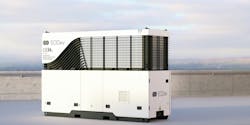United Rentals Outlines Four Essential Steps to Low-Emission and Zero-Emission Jobsites
United Rentals, the world’s largest equipment rental company, today outlined ways companies can implement sustainable business practices that reduce equipment greenhouse gas (GHG) emissions while maintaining jobsite productivity and safety. United Rentals released a white paper, "Roadmap to Low-Emission and Zero-Emission Jobsites," which shares four practical steps to reduce emissions and the tools and equipment to make sustainability strategies a reality on the jobsite.
These practices employ digital tools to guide fleet sustainability decisions and greener equipment options that help construction and industrial companies reach lower-emission targets without erasing profit margins.
“For companies with budgets large or small, reducing jobsite emissions is possible now,” said Grant Zoldowski, director of environmental management, United Rentals. “A smart jobsite sustainability strategy starts with data. Targeting the predominant sources of emissions on projects and jobsites allows companies to focus their efforts and dollars on changes that will yield the biggest results. This approach provides the foundation for more sustainable power generation, battery storage and electric equipment options.”
Here are four initiatives companies can take today to make their jobsites more sustainable.
Identify the Biggest Improvement Opportunities: Companies can use data to guide decisions around fleet sustainability efforts to identify changes that yield the biggest return on investment.
Embrace Power Generation Alternatives: New power generation options open the door to greener operations that provide the power needed for productivity and safety. Cleaner-burning generators that use propane, natural gas, renewable diesel or hydrogen are available now. Power options include combining solar panels with a battery to provide a quiet, zero-emission renewable energy generator.
Leverage Battery Energy Storage: New energy storage solutions enable companies to reduce the use of emission-generating portable power equipment. Bigger and better standalone batteries have the power to replace some diesel generators. Hybrid power systems that use a battery to store excess power can slash generator run time along with fuel use and emissions.
Incorporate Electric or Hybrid Equipment: Electric equipment offers performance on par with diesel-fueled equipment while eliminating direct emissions. Lower operating costs and significantly reduced maintenance needs partially offset the higher upfront expense. Lithium-ion batteries and electric engines are essentially maintenance-free.
“Renting provides an opportunity for companies to experiment with more sustainable solutions such as electric machines, portable power options, and battery energy storage systems without investing in new equipment. All of these technologies can work together to reduce the reliance on petroleum-based diesel and help companies shift to lower-emission and even zero-emission fleets,” said Zoldowski.
About the Author
Michael Roth
Editor
Michael Roth has covered the equipment rental industry full time for RER since 1989 and has served as the magazine’s editor in chief since 1994. He has nearly 30 years experience as a professional journalist. Roth has visited hundreds of rental centers and industry manufacturers, written hundreds of feature stories for RER and thousands of news stories for the magazine and its electronic newsletter RER Reports. Roth has interviewed leading executives for most of the industry’s largest rental companies and manufacturers as well as hundreds of smaller independent companies. He has visited with and reported on rental companies and manufacturers in Europe, Central America and Asia as well as Mexico, Canada and the United States. Roth was co-founder of RER Reports, the industry’s first weekly newsletter, which began as a fax newsletter in 1996, and later became an online newsletter. Roth has spoken at conventions sponsored by the American Rental Association, Associated Equipment Distributors, California Rental Association and other industry events and has spoken before industry groups in several countries. He lives and works in Los Angeles when he’s not traveling to cover industry events.
